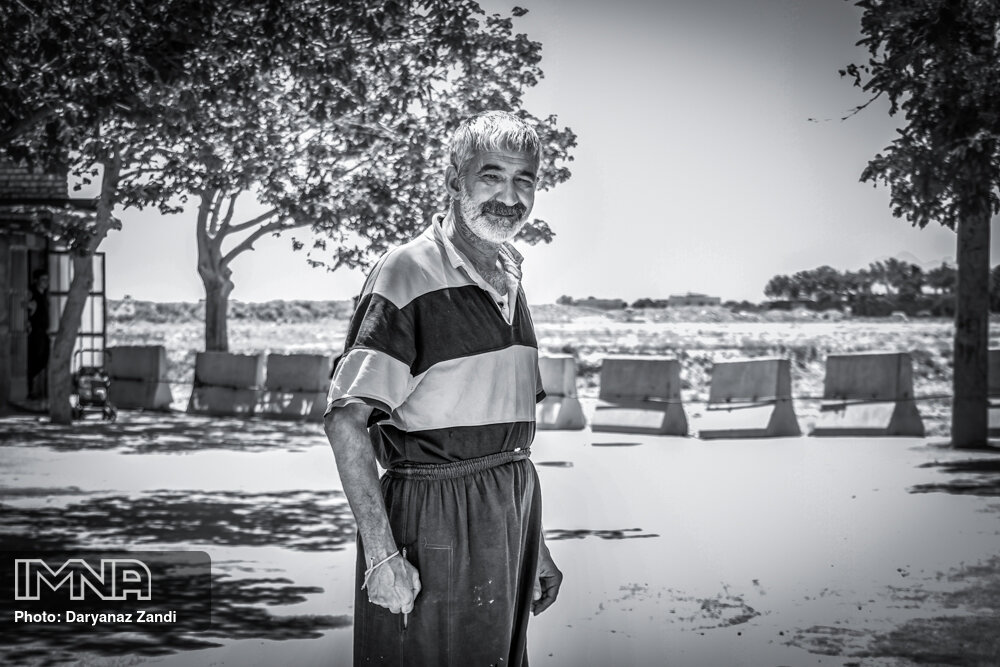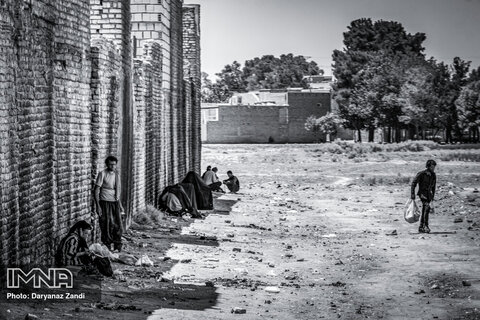Iran (IMNA) - Isfahan, a beautiful city in Iran, is known for its rich history, stunning architecture, and vibrant culture. However, like any other city, Isfahan also has its share of poor and deprived neighborhoods.
One such neighborhood is located on the outskirts of Isfahan, where many low-income families reside. This area faces several challenges, including limited access to basic amenities and services. The dilapidated houses and inadequate infrastructure make living conditions quite challenging for the residents.
“The major issue is the lack of recreational facilities and community spaces. We don't have parks or safe places to play and socialize. This leaves us with limited options for leisure activities, and it affects our overall well-being, ” Ali, who has lived in Hasse for about 27 years, told IMNA’s journalist
“I want to emphasize that we, the children of Hasse, deserve equal opportunities and a chance to thrive. It's not just about us, but about creating a more equitable society for everyone. We need the support and attention of those in power to address these issues and work towards a brighter future for all,” he continued.
"We feel neglected and forgotten. Our voices are not heard, and there is a lack of initiatives to improve the situation. It's disheartening because every child deserves equal opportunities in life, " Ali sighed.

Deprived neighborhoods in Iran often suffer from a lack of basic amenities such as reliable infrastructure, quality education, healthcare facilities, and employment opportunities. These challenges create significant disparities within society, leading to marginalization and exclusion of certain groups. Recognizing these issues is the first step towards implementing effective measures to promote social justice and inclusion.
Ensuring Equal Access to Basic Services
To achieve social justice and inclusion, it is essential to ensure equal access to basic services in deprived neighborhoods. This includes improving infrastructure, providing quality education, healthcare, and sanitation facilities, and offering equal employment opportunities. By addressing these fundamental needs, we can bridge the gap between different segments of society and promote inclusivity.
Empowering Marginalized Communities
Empowering marginalized communities in deprived neighborhoods is crucial for fostering social justice. This can be achieved by investing in skill development programs, vocational training, and entrepreneurship initiatives targeted at individuals from disadvantaged backgrounds. By providing them with the necessary tools and resources, we enable them to actively participate in society, thus reducing inequality.
Encouraging Community Engagement
Promoting social justice and inclusion requires active community engagement. Encouraging residents of deprived neighborhoods to participate in decision-making processes, community initiatives, and local governance empowers them and gives them a voice. This involvement fosters a sense of ownership, enhances social cohesion, and ensures that policies and programs reflect the needs and aspirations of the community.
Fostering Interethnic and Intercultural Understanding
Deprived neighborhoods in Iran are often home to diverse ethnic and cultural groups. Promoting social justice and inclusion necessitates fostering interethnic and intercultural understanding. By promoting dialogue, respect, and appreciation for different cultures, we can create an environment that celebrates diversity and rejects discrimination. This inclusive approach builds stronger communities and paves the way for a more harmonious society.
Collaborative Efforts and Partnerships
Addressing the challenges faced by deprived neighborhoods requires collaborative efforts from various stakeholders, including government bodies, non-profit organizations, community leaders, and residents themselves. By forming partnerships, sharing resources, and implementing joint initiatives, we can amplify the impact of our actions and create sustainable change.
Efforts in Isfahan
Recognizing the need for social justice and inclusion, Isfahan has implemented several initiatives to uplift marginalized neighborhoods. These efforts encompass various aspects, including education, employment, healthcare, and infrastructure development. The government, in collaboration with non-governmental organizations, has been working tirelessly to bridge the gaps and provide equal opportunities for all residents of Isfahan.

Education
Education plays a vital role in breaking the cycle of marginalization. Isfahan has taken significant steps to improve access to quality education in marginalized neighborhoods. Special attention is given to enhancing school facilities, providing scholarships, and promoting inclusive teaching practices. This enables children from these areas to receive a comprehensive education, empowering them to pursue higher studies and secure better prospects for the future.
Employment
Unemployment is a significant challenge faced by marginalized neighborhoods. To address this issue, Isfahan has implemented job creation programs, vocational training, and entrepreneurship schemes. These initiatives aim to equip individuals with the necessary skills to secure stable employment or start their own businesses, thereby fostering economic growth within these communities.
Healthcare
Access to healthcare is another crucial aspect of social justice. Isfahan has established healthcare centers in marginalized neighborhoods, ensuring that residents have convenient and equitable access to medical services. Additionally, awareness campaigns and preventive healthcare programs are conducted to promote overall well-being and address specific health concerns prevalent in these areas.
Infrastructure Development
Improving infrastructure in marginalized neighborhoods is vital for enhancing the overall quality of life. Isfahan has invested in upgrading basic amenities such as water supply, sanitation, transportation, and housing facilities. These developments not only address immediate needs but also create an environment conducive to community growth and prosperity.
Promoting social justice and inclusion in deprived neighborhoods of Iran is not only a moral imperative but also a pathway to a more equitable and prosperous society. By ensuring equal access to basic services, empowering marginalized communities, encouraging community engagement, fostering interethnic and intercultural understanding, and fostering collaborative efforts, we can create a society where everyone has the opportunity to thrive. Let us work together to build a future that embraces social justice and inclusion for all.


Your Comment